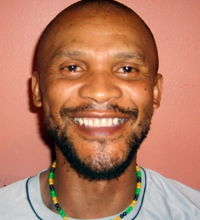|
It’s a whole different story, can’t you see? He whispers
to her in the darkness.
I don’t understand, no, I don’t
see, she wanted to reply, but she kept it to herself, as usual.
Every time he said it, she struggled to understand what he meant.
He has been harping on it, as if it was crystal clear, as in black
and white.
Snoring already! She nudged him mildly
with an elbow. It was like that after love-making these days. We
are ageing… she shrugged it off.
The wind whistles against the rusty zinc that made up the five walls
of their room; their house, which they never called home. Home
has always been somewhere else, a distant place that lingers only
in their words, and as green apparitions in their minds. She cuddles
close to him and quietly says a prayer for Frieda and Pedro. His
heart pumps rhythmically under her ear, hushing her like a cradle.
In the morning she places a blue plastic wash basin with water on
the chair and begins to wash his blue overalls. He is going to a
residents' meeting after work, no need to wait up for him. There
are plenty of them lately, these meetings, damn them for occupying
father of Jama’s mind.
Where did you buy these clean soup bones, father of Jama, she asks
at supper? Everything is fong-kong these days, not even a dog would
find flesh in here! She throws her hands about helplessly after
putting his plate on the table.
We are the kicking ball of whites and
amaKwerekwere, Nolusapho, he answers, his voice heating
up as he proceeds, our own government has opened us up to this evil.
Oh father of Jama, poverty is poverty,
those of us who are born in dust know its taste, that is the burden
of our heritage.
That was his problem with our country, he had told the meeting earlier
that evening. Everyone expects us to live on dust like desert plants.
Two elections and what do we have? Where are the houses and jobs
and equality promised by Mandela and Mbeki? We have more shacks,
more Pakistanis, more maKwerekwere who come here with nothing
but end up with shops and houses! What about us, eh? It is not right.
We must fight.
But, father of Jama, there are terrible wars in those countries,
she tried to reason, you yourself know that. Besides, people are
people, we must share poverty to make its burden lighter.
I know all that, but poverty or no
poverty this is too much. They must go back to their countries and
solve their problems, not flock here. We must fight them. If our
government cannot protect us from their invasion, we must stand
up and fight!
He has been complaining a lot. Sometimes he comes late and just
stares at the food and the small tv screen. Then he wears a cover
of steel around his brain so that when she looks at his face, he
stares without blinking. She searches for his eyes but they are
not there. Occasionally, when she does locate them, she finds only
smoke-filled sockets.
I’m glad Frieda and Pedro escaped unharmed, she confesses
to Refilwe.
Refilwe is too careful, she is a child
of the times, this one, solid as a rock. She turns around and peeps
in all directions before responding: They say it will not end till
the government deports all of them, mmm… what madness is this?
Where must God’s people go? Shh… Don’t raise your
voice, ntombi*, there might be someone in the toilet,
and besides even walls have ears, my friend.
You are right tshomi*, one can never be too careful.
But it’s terrible what they’ve done, to take all of
a poor person’s belongings just like that. Everything gone
like that without shame, sies!*
You know Mimi who is married to Pedro’s compatriot Augustino?
Yes I know her, she goes to the Zionist's
church in phase 2 neh*?
Ja, that one. She says her
husband fled with their four-year-old son. Augustino called Mimi
from Yeoville — they are all staying with other Angolans who
live there.
Oh what a relief, they are all safe
at least.
Yes. Oh how I miss Frieda, we must
go see how they are doing there in Yeoville.
Yes you’re right my friend.
He comes home in the middle of the night, she switches the light
on. He is busy undressing hurriedly as she sits up to confront him.
Where do you come from this late, father of Jama? And what is that
foul smell, where did you get mixed up with petrol?
Go back to sleep mfazi, he whispers, there’s a war raging out there. He washes his upper
body in the blue washing basin before joining her in bed. His heart
is beating like a mad drum. Loud sirens fill the night air.
In the morning they are woken up by heavy commotion. Mimi’s
house is filled with people and the police are inspecting a neat
pile of black ashes. A pair of half-burned brown boots lie carelessly
near the ashes.
They have burnt him! They have killed
him! What did my Tino do, God of the heavens, what did he do? Mimi
wails uncontrollably before the crowd. A policewoman in uniform
is struggling to calm her down.
Nolusapho stares at his blue overalls
jacket smelling of petrol; then she commences to wash it dutifully,
slowly, her actions raising and spilling a bright white foam. Later,
it flaps violently on the washing line. The heavy wind raises a
storm of dust amid a sprawling ocean of shacks and people run for
cover in the streets. 
Glossary
[ntombi] Girl.
tshomi] Friend
[sies] Shame – sies is an expression of disgust
in Afrikaan
[neh] Right? Or, not so?
[mfazi] Woman |
|
|
|











![]()
![]()
![]()
![]()

